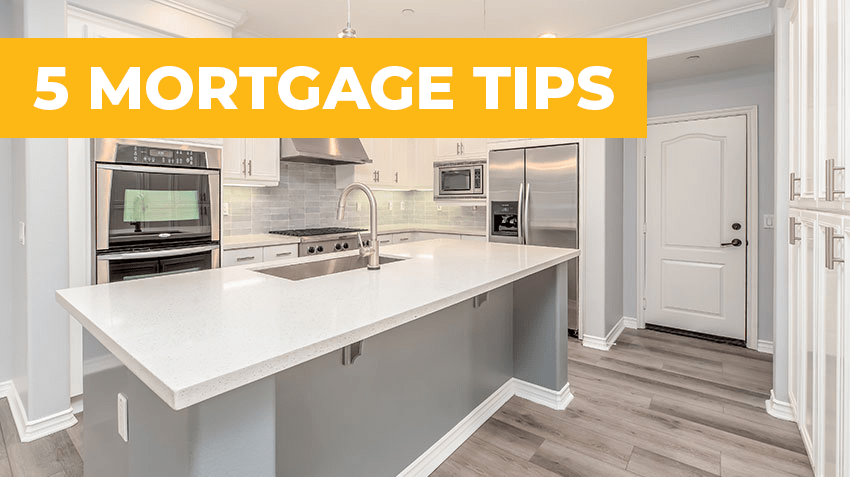Navigating the mortgage process isn’t very straightforward. There’s a lot of information and misinformation out there on how much to put down, which loan to get and the list goes on, but your mortgage is unique to you. A trusted mortgage advisor is the best person to guide you through the transaction. However, we know browsing the internet for information is in our DNA so we complied a list of home buying tips for you below.
1. You Don’t Have to Put 20% Down
VIDEO TRANSCRIPT
I need 20% down to buy a house. Not true. In today’s world you can buy a house with as little as 3% down and it’s different for everyone. You might not want to put 20% down and with PMI being as low as it is today it is a lot more palatable to not have to do that. So for all of you that you know really believe that you got to put 20% down there’s a lot of homeowners that don’t do that. Be mindful, obviously you’ve got to do what’s right for you, but I do believe that keeping the money in your pocket with rates as low as it is that it might make more sense to borrow the money at a lower rate as opposed to spending all your money and
putting it on the equity of the house.
2. Get Preapproved, Not Prequalified
VIDEO TRANSCRIPT
A prequalification is a very low level type qualification where you haven’t actually sent any paperwork in. A pre-approval is much more in-depth – you send in your pay stubs your w-2s and all of that is run through DU. So what you need when you’re shopping for a house you need security and you need to know exactly what’s gonna happen. You do not want to get under contract without knowing for sure that you’re gonna qualify for the house so get an actual pre-approval. If you get pre-approved and it seems too easy and you haven’t set that stuff in it doesn’t mean anything.
3. Wait to Change Jobs Until After the Mortgage Transaction is Complete
VIDEO TRANSCRIPT
Hey, what’s going on everybody? It’s Nathan Nix with your Omega60 and I wanna talk to you about job stability once you go under contract with purchasing your new home or refinancing. So what we look at is this thing called the ability to repay… your “ATR.” If you have a job and you’re about to transition then don’t do it in the middle of your mortgage transaction because that’s your income and we need to know that you have that income continuously coming in so if you leave your job or you retire or you get fired or whatever it is, we need to know that right away because that means that your income is cut off. If your income is cut off then we can’t calculate your ability to repay. And that can kill an entire deal so if you’re thinking about changing jobs or doing something that’s gonna change your employment status just hold off close on the loan and then after that do it is what you have to do but during the mortgage process stay put. Take it easy. Be stable and we’ll get it to the closing table. Take care.
4. Private Mortgage Insurance Isn’t Bad (or Expensive)
VIDEO TRANSCRIPT
Hey! It’s Paul Apostolakis with Omega Lending. So today I want to talk to about PMI. Real quick definition – PMI is what you get charged, the consumer or the borrower to borrow money when they put less than 20% down. It’s an insurance that protects the lender the primary lender from you defaulting on that other portion because normally back in the day you couldn’t do anything unless you put 20% down. In today’s market you don’t have to do that. In the past PMI was considered bad because it was expensive. Well in today’s market PMI has gotten so low that it’s really palatable. Depending on your credit score it might be like 40 or 50 dollars a month which keeps money in your pocket and you don’t have to put up down that big down payment you’re not getting hammered to that PMI. So keep that in mind. Good companies right now position themselves really well with PMI providers to provide really reduced PMI rates for for borrowers. So don’t be afraid of putting less than 20% down because going forward I think cash is gonna be king keeping more money in your pocket if it makes sense is smart. You don’t want to completely drain your savings to buy a house.
5. Use a Real Estate Agent – They’re Free!
VIDEO TRANSCRIPT
What’s up everyone? Paul Apostolakis here with your Omega60. Having a real estate agent help you buy a house is free. A lot of people don’t understand that. A lot of buyers right now are like oh you know if I get an agent when I’m looking for houses… if you’re looking for a house when you employ that agent, you’re getting free representation. A lot of people don’t get that. I’ve been hearing that a lot like “hey how much is it gonna cost for me to get an agent to work with me when looking for a house?” It’s not gonna cost you anything and there’s nothing more important right now than having a good agent represent you in the negotiations. Again today’s agent isn’t gonna probably find you the house because it’s all over the place… it’s on the internet, it’s on Zillow, what they’re gonna do is they’re gonna help you negotiate and get the best deal and protect you when you’re doing a legal contract like the purchase agreement.
Conclusion
If you’re looking to purchase a new home, talking to a professional about your mortgage is a good idea. Our team is always willing to explain your loan options and walk you through the home buying process. Interested in refinancing? Do so at no-cost to you. Whatever the case, you can start the mortgage process today.




